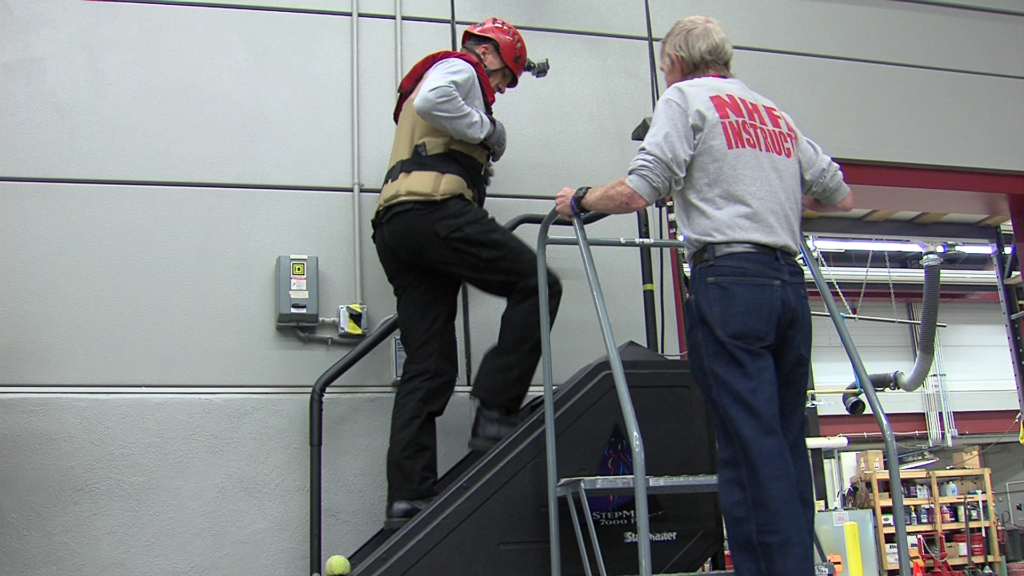Course Description
The Candidate Physical Ability Test (CPAT) is a standardized physical assessment of a firefighter candidate’s ability to perform common fireground tasks. It was developed through the Fire Service Joint Labor-Management Task Force wellness and fitness initiative in 1997 between the International Association of Fire Chiefs and the International Association of Fire Fighters.
According to the International Association of Fire Chiefs, the goal when developing the test program was “to develop a fair and valid evaluation tool in the selection of firefighters to ensure that all firefighter candidates possess the physical ability to complete critical tasks effectively and safely.”
According to the IAFC, “after discovering municipalities were hiring people who would not be physically capable of a successful career in the fire service the task force unanimously agreed to create a physical ability test for pre-employment testing of candidates. The task force developed and validated the Candidate Physical Ability Test (CPAT), resulting in a consistent test for hiring firefighter candidates.
The test is managed and administered via a set of standards. A training course is set up with stations designed to replicate common firefighting tasks. A participant is timed as they complete each testing station in order.
CPAT is a pass/fail test with a time limit of 10 minutes and 20 seconds. During the entire test the candidate will wear a 50 lb. weighted vest. This simulates the weight of a firefighters’ protective clothing and equipment. An additional 25 pounds (11.34 kg), using two 12.5-pound (5.67-kg) weights that simulate a high-rise pack (hose bundle), is added to the participant’s shoulders for the stair-climb event. Participants wear a hard hat with chin strap and work gloves. Additional information can be obtained when registering for each CPAT offering and from the CPAT coordinator.
The 8 CPAT events are:
-
- Stair Climb (climbing stairs while carrying an additional 25 lb. simulated hose pack)
-
- Ladder Raise and Extension (placing a ground ladder at the fire scene and extending the ladder to the roof or a window)
-
- Hose Drag (stretching uncharged houseline’s, advancing lines)
-
- Equipment Carry (removing and carrying equipment from fire apparatus to fireground)
-
- Forcible Entry (penetrating a locked door, breaching a wall) and
-
- Search (crawling through dark unpredictable areas to search for victims)
-
- Rescue Drag (removing victim or partner from a fire building)
-
- Ceiling Pull (locating fire and checking for fire extension)
Successful completion of the CPAT is a requirement for many firefighting positions, including all full-time firefighting positions in the State of New Hampshire, and the test provides a standard assessment that is used across the country. The CPAT is a challenging test, and candidates must be prepared to work hard and demonstrate their ability to perform under pressure.
Crucial Resources
Frequently Asked Questions
-
- How long is the CPAT valid?
In New Hampshire, the CPAT is valid for 26 months. Candidates should re-test well before their CPAT expiration date. CPAT certification is a “pre-hiring” requirement. Those who are not CPAT certified cannot be hired full-time in NH.
THERE WILL BE NO WRITTEN ENTRANCE TEST GIVEN.
- How long is the CPAT valid?
-
- How do I get on the State Entrance List?
State Entrance lists are generated several times a year. In order for candidates to get their names on the list, they have to pass the NH CPAT test or submit an out-of-state CPAT certificate for reciprocity, along with a fee.
- How do I get on the State Entrance List?
-
- What information can I use to help me prepare for the CPAT events?
Firstly, you should read and familiarize yourself with the entire application packet. Also, all applicants will be scheduled for a physical ability test as outlined in the CPAT Orientation Guide and CPAT Orientation Video. Candidates are not required to sign up for an Orientation Session, but it is highly recommended. Candidates who attend an orientation session must be dressed in the same manner as they would for the CPAT exam. All applicants will benefit from reading and familiarizing yourself with the CPAT Preparation Guide.
- What information can I use to help me prepare for the CPAT events?
-
- What is the dress code for the CPAT and Orientation Sessions?
The dress code can be found in the CPAT Orientation Guide. It states, “Throughout all events, the candidate must wear long pants and footwear with no open heel or toe. Watches and loose or restrictive jewelry are not permitted.”
- What is the dress code for the CPAT and Orientation Sessions?
-
- What do I bring with me on my test day?
Bring your Driver’s License to check into the exam. Make sure you are dress-code approved (see above for Dress Code): NO SHORTS.
- What do I bring with me on my test day?
-
- How do I pick my date and time?
We will assign you a date and time as space is available. You will indicate the month desired for orientation and/or the CPAT exam on your application. We will schedule you on a “first-come, first-served” basis, starting with the first date and earliest time available. A candidate’s testing date and time cannot be guaranteed. Confirmations will be emailed to approved candidates. Applications received less than 30 days prior to the desired month of testing are not guaranteed a spot in that exam. Please plan accordingly.
- How do I pick my date and time?
-
- What if I need to change my test date?
We cannot guarantee that special circumstances can be accommodated, and we cannot guarantee admittance into an exam when an application comes in less than 30 days before the desired test date. Please call the Fire Academy at 603-223-4200 if something necessitates a change of test date or time, and we will try to accommodate the request. As a reminder, the fee is non-refundable.
- What if I need to change my test date?


